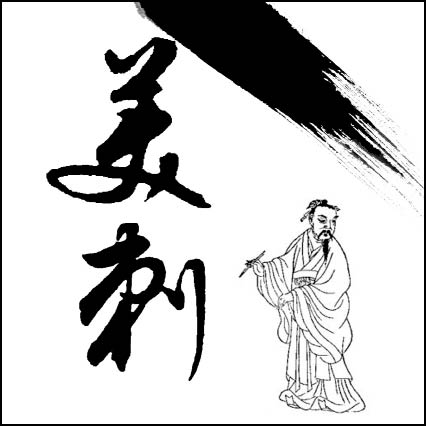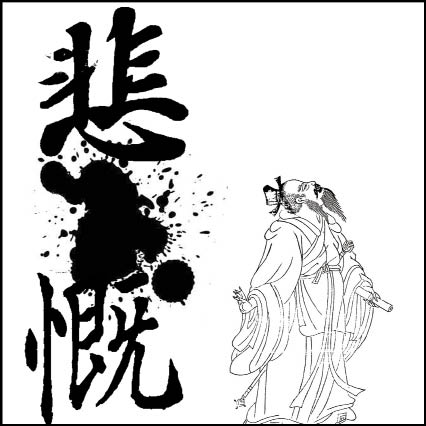
美刺
měicì
Extolment and Satirical Criticism
赞美与讽刺批评。用于文学艺术领域,主要指用诗歌对统治者的品德、政令和作为进行赞美或讽刺批评。孔子最早指出“诗可以怨”,强调《诗经》具有抒发不满情绪的功用,确定了诗歌创作的基本功能。汉代的诗学则迎合统治者的需要,突出诗歌歌功颂德的功能。汉代诗学作品《毛诗序》和郑玄《诗谱序》将“美刺”确立为诗歌批评的基本原则之一,使之成为后世诗人和作家的自觉追求,是他们参与政治、干预社会生活的一种方式,从而构成中国文学的基本功用与重要特色。
This literary term is used in poetry to comment on a ruler’s moral character, policies, decrees, and performance, either in praise or criticism. Confucius was the first to point out that poetry could be used to vent resentment and thus established a basic function of poetry writing by emphasizing the role The Book of Songs played in voicing grievances. In the Han Dynasty, however, poetry tended to be used as a vehicle for extolling the accomplishments and virtues of rulers. In “Preface to Mao’s Version of The Book of Songs” and “Preface to On the Categories of The Book of Songs,” two influential writings on theory of poetry published during the Han Dynasty, extolment and satirical criticism was regarded as an underlying principle of poetic criticism. This principle was widely employed by poets and writers of later generations as a way of getting involved in politics and making their impact on the society. This constituted a fundamental function and an essential feature of Chinese literature.
引例 Citations:
◎论功颂德,所以将顺其美;讥刺过失,所以匡救其恶。(郑玄《诗谱序》)
([诗歌]歌颂朝廷功德,是为了让他们延续光大好的方面;讽刺批评其过失,是为了让他们匡救改正不好的方面。)
Poems are composed to applaud the rulers to continue to do what is good by extolling their achievements and virtues, and to urge them to change the erroneous course by satirizing and criticizing their wrong doings. (Zheng Xuan: Preface to On the Categories of The Book of Songs)
◎汉儒言诗,不过美刺两端。(程廷祚《青溪集·诗论十三·再论刺诗》)
(汉代儒者论说诗歌,不外乎赞美歌颂与讽刺批评两方面。)
To Confucian scholars in the Han Dynasty, poetry has two basic functions: extolment and satirical criticism. (Cheng Tingzuo: Qingxi Collection)

悲慨
bēikǎi
Melancholy and Resentment
悲伤愤慨。慨,感慨,愤慨。是晚唐诗人司空图所概括的诗歌的二十四种风格之一。主要指诗作中所表现出的悲剧性情结。当诗人命途多舛或身处困境,或面对壮阔景观或大的事件而自觉力量渺小,会产生忧愁、悲哀、感伤、激愤的情绪,投射到诗歌创作中则形成“悲慨”风格。这一术语看似近于西方文学理论的“悲剧”范畴,实质上受道家思想影响较大,而最后往往趋于无奈或趋于旷达。
Melancholy and resentment, which here refers to a sense of helplessness found in poems, is one of the 24 poetic styles summarized by Sikong Tu, a poet in the late Tang Dynasty. Faced with frustrations and tough challenges in life, or overwhelmed by the immensity of nature or major events, poets were often seized by dejection, grief, sadness, and anger, which gave rise to a “melancholy and resentment” style in poetry writing. While the style bears similarity with the genre of tragedy in Western literary tradition, it is more influenced by Taoism, often featuring a sense of resignation or stoic optimism.
引例 Citations:
◎大风卷水,林木为摧。适苦欲死,招憩不来。百岁如流,富贵冷灰。大道日丧,若为雄才。壮士拂剑,浩然弥哀。萧萧落叶,漏雨苍苔。(司空图《二十四诗品·悲慨》)
(大风卷起狂澜,树木遭受摧折。心中悲苦痛不欲生,想休憩片刻亦不可得。百年岁月像流水永逝,富贵和繁华都化作冷寂尘埃。世道日益沦丧,谁是当世雄才?壮士拔剑仰天叹,凝望苍穹愈悲哀。好比落叶萧萧下,且听漏雨滴苍苔。)
Winds are howling, waves raging, and tree branches breaking. Gripped by an agonizing pain at my heart, I yearn for a spell of peace but only in vain. As time slips by, year after year, decade after decade, all the riches, fame, and splendor are but nothing. Facing moral degeneration, who will rise and salvage the world? With sword in hand, I heave a deep sigh and stare intensely at the sky. Overwhelmed with sorrow, all I can do is to watch leaves falling and hear rain beating against the moss. (Sikong Tu: Twenty-four Styles of Poetry)
◎感叹之余,作诗相属,托物悲慨,阨穷而不怨,泰而不骄。(苏轼《和王晋卿[并叙]》)
(在感叹之余,蒙其作诗劝慰嘱咐,借景物抒发内心悲伤愤慨的情绪,虽遇困厄而不怨恨,命运通达也不骄狂。)
After a deep sigh, he wrote a poem to admonish and comfort me, in which he expressed his indignation and resentment by making an analogy with imagery. He advised me not to begrudge tough times or be complacent when everything goes well in life. (Su Shi: A Poem in Reply to Wang Jinqing with a Preface)
Selected from Key Concepts in Chinese Thought and Culture published by Foreign Language Teaching and Research Press.







